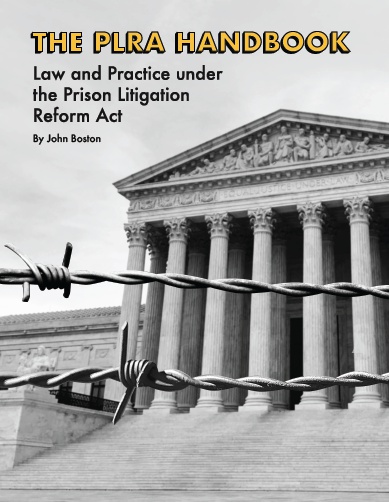PLN wins largest award for prison or jail censorship in U.S.
First Amendment Center, Jan. 1, 2012.
http://www.firstamendmentcenter.org/s-c-county-...
PLN wins largest award for prison or jail censorship in U.S. - First Amendment Center 2012
S.C. county to pay almost $600K to settle jail-censorship suit
David L. Hudson Jr.
First Amendment Scholar
Thursday, January 26, 2012
The group that publishes a monthly newsletter for inmates says it has reached the largest jail-censorship lawsuit settlement ever with a prison. The Jan. 13 settlement was reached with the Berkeley County, S.C., sheriff’s office over the censorship of reading materials at Hill-Finklea Detention Center in Moncks Corner.
Under the settlement, the defendants will pay $100,000 in damages and nearly $500,000 in attorney fees and costs to the American Civil Liberties Union and Prison Legal News. The newsletter’s editors contend that this is the largest-ever settlement for such a case.
"The settlement with Berkeley County was the largest monetary award in a First Amendment prison or jail-censorship case in the United States," Associate Editor Alex Friedmann told the First Amendment Center. "It reflects the seriousness of the constitutional violations committed by the county."
The ACLU and Prison Legal News sued in October 2010 after jail officials rejected the newsletter addressed to several inmates.
An official with the detention center responded in court papers that "inmates are only allowed to receive soft-back bibles in the mail directly from the publisher" and "are not allowed to have magazines, newspapers, or any other type of books." The county later claimed that it rejected the publications because they contained staples.
Sandy Senn, the attorney who defended Berkeley County, told The Berkeley Independent newspaper that jail employees would now remove staples from publications.
"If it wasn’t for this lawsuit we’d continue to be rejecting [Prison Legal News] because of staples," she said.
She also disputed the contention that Christian Bibles were the only texts allowed.
"They were trying to say we only allowed the Bible in the jail," she was quoted by the newspaper as saying. "Other primary religious texts are always allowed."
She said that the lowercase "bible" means any religious book, not just the Christian Bible.
The settlement includes a "consent injunction," which sets forth a policy for the prison officials to follow on inmate mail. The detailed procedure includes a statement that a publication will be rejected "only after a Formal Determination by the Director that the publication is a genuine threat to the safety or security" of the detention center.
"Rather than complying with the First Amendment, the county engaged in a scorched-earth approach to this litigation," Prison Legal News Editor Paul Wright said in a news release. "The monetary settlement paid by the county reflects that approach. County taxpayers are ill-served when public officials violate the Constitution and then try to defend their unlawful conduct with post-hoc rationalizations rather than remedy the violations. Had the county been willing to resolve this case promptly it would have concluded much sooner, at a lower cost to the county and to the Constitution."
S.C. county to pay almost $600K to settle jail-censorship suit
David L. Hudson Jr.
First Amendment Scholar
Thursday, January 26, 2012
The group that publishes a monthly newsletter for inmates says it has reached the largest jail-censorship lawsuit settlement ever with a prison. The Jan. 13 settlement was reached with the Berkeley County, S.C., sheriff’s office over the censorship of reading materials at Hill-Finklea Detention Center in Moncks Corner.
Under the settlement, the defendants will pay $100,000 in damages and nearly $500,000 in attorney fees and costs to the American Civil Liberties Union and Prison Legal News. The newsletter’s editors contend that this is the largest-ever settlement for such a case.
"The settlement with Berkeley County was the largest monetary award in a First Amendment prison or jail-censorship case in the United States," Associate Editor Alex Friedmann told the First Amendment Center. "It reflects the seriousness of the constitutional violations committed by the county."
The ACLU and Prison Legal News sued in October 2010 after jail officials rejected the newsletter addressed to several inmates.
An official with the detention center responded in court papers that "inmates are only allowed to receive soft-back bibles in the mail directly from the publisher" and "are not allowed to have magazines, newspapers, or any other type of books." The county later claimed that it rejected the publications because they contained staples.
Sandy Senn, the attorney who defended Berkeley County, told The Berkeley Independent newspaper that jail employees would now remove staples from publications.
"If it wasn’t for this lawsuit we’d continue to be rejecting [Prison Legal News] because of staples," she said.
She also disputed the contention that Christian Bibles were the only texts allowed.
"They were trying to say we only allowed the Bible in the jail," she was quoted by the newspaper as saying. "Other primary religious texts are always allowed."
She said that the lowercase "bible" means any religious book, not just the Christian Bible.
The settlement includes a "consent injunction," which sets forth a policy for the prison officials to follow on inmate mail. The detailed procedure includes a statement that a publication will be rejected "only after a Formal Determination by the Director that the publication is a genuine threat to the safety or security" of the detention center.
"Rather than complying with the First Amendment, the county engaged in a scorched-earth approach to this litigation," Prison Legal News Editor Paul Wright said in a news release. "The monetary settlement paid by the county reflects that approach. County taxpayers are ill-served when public officials violate the Constitution and then try to defend their unlawful conduct with post-hoc rationalizations rather than remedy the violations. Had the county been willing to resolve this case promptly it would have concluded much sooner, at a lower cost to the county and to the Constitution."







